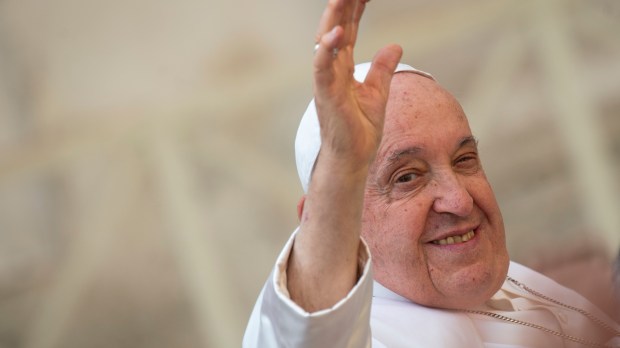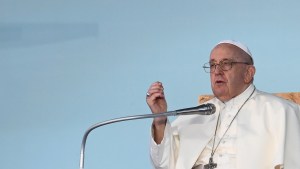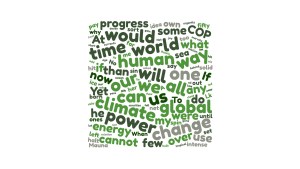In early November, on Italian television, Pope Francis once again recounted how Ségolène Royal suggested in 2014 that he bring forward the publication date of the encyclical Laudato si’ so that it would be published before the Paris climate summit at the end of 2015.
The COP21 (2015) President and formerFrench Environment Minister remembers the episode well. She agreed to answer I.MEDIA’s questions during a visit to Rome.
As the head of the Catholic Church has announced that he will be attending COP28 in Dubai in December, Ségolène Royal hails Pope Francis’ ability to “stir consciences” and his call for an “integral ecology.”
The interview
Aleteia: Pope Francis regularly talks about how you asked him to speed up the publication of the encyclical Laudato si’ so that it would appear before COP21 in Paris. How did this happen?
Ségolène Royal: I volunteered to welcome Pope Francis to Strasbourg on behalf of France in November 2014. After the welcome on the tarmac, we were taken to a protocol lounge at the airport while we waited for the departure to the European Parliament. A few days before I had read that he was preparing an encyclical on climate. At the time, I was preparing for COP21, with the obvious concern that it should lead to a decision. I asked him about it, and he replied that he was indeed working on it for publication in two years’ time.
As he has pointed out several times, I dared to suggest that he bring it forward before the Paris summit, so that it could mobilize people’s consciences. He reacted immediately, telling me it was an obvious decision. In front of me, he called the Vatican! And I heard him say, “I’m here with Ms. Ségolène Royal, Minister for the Environment. We absolutely must speed things up, and as soon as I get back to the Vatican, I want to see where you are at.” I was stunned. And the encyclical was published before COP21…
Pope Francis and integral ecology
How has Laudato si’ played a positive role in the fight against global warming?
Royal: It’s the most beautiful and forward-looking text on the planet since the first Earth Summit. The Pope was the first to express the concept of integral ecology. The idea is not to protect nature for nature’s sake, but to understand that when you protect nature, you are also protecting human beings, taking care of them by protecting our common home.
The Pope’s words are totally free of self-interest, which gives him the ability to stir consciences. In his analysis, he takes the offensive in his denunciation of financial capitalism. He explains that this capitalism can only destroy nature, because it considers the planet a free good, handed over to predators, and that anything that is not immediately profitable is worthless. A tree takes years to grow, but can be destroyed in no time at all. There’s a dissymmetry between nature’s long life and the speed with which it can be destroyed. Beyond Christian considerations, everyone can relate to this universal encyclical.
This text also gave us the idea of organizing the Summit of Consciences for the Climate, held a few weeks before COP21, bringing together representative authorities of all religions and freethinkers, giving a spiritual dimension to the Paris Climate Agreement.
Was it a surprise to you that the Church would dedicate an encyclical to the environment?
Royal: I wasn’t expecting it. It’s the first time in the history of the Church that a pope has taken such an interest in ecology. But if we think about it, Francis is following in the footsteps of St. Francis of Assisi, who was already very ‘modern’ — so to speak — regarding the need to protect and care for nature.
The real human impact of climate change
Can the Pope and the diplomacy of the Holy See have a real influence on the ecological transition in certain countries, in Africa for example?
Royal: I think the words of the Holy See are heeded. They make the link between poverty and climate change. Let’s remember Pope Francis’ powerful image of “the cry of the poor joining the cry of the earth.” He doesn’t hesitate to challenge people’s mentality. Recently, on Italian television, he recounted how oil producers had come to see him to justify themselves after the publication of Laudato si’.
During COP21, I heard Africa’s cry of alarm during a reflection on the Lake Chad region. They pointed out that the rise of Boko Haram was due to global warming, the collapse of village structures and subsistence farming. Extreme poverty leaves room for terrorist movements that provide a little money, a uniform and weapons…
Linking the issue of mass population migration with global warming is also important. As the Pope reminded us during his trip to Marseille in September, the migration issue can only be resolved if we respond to the climate challenge.
Pope Francis will be in Dubai for COP28. It’s a first for a pope. Is his presence more than a symbol?
Royal: It’s very good news, especially as the COP21 review is on the agenda. Pope Francis has pointed out that not much has happened since the Paris conference, and that the energy that came out of 2015 has somewhat evaporated.
The choice of Dubai is interesting because it’s a country that produces fossil fuels. It’s a good thing that such countries are starting to work towards a post-oil future, and I hope that decisions will be up to the task and clearly state that we need to find solutions to replace the energy sources that cause climate catastrophes.
Changes needed to make progress
In an update to Laudato si’ published at the beginning of October and entitled Laudate Deum, the Pope calls for “binding forms of energy transition.” These must be “efficient, obligatory, and readily monitored,” he adds. Is this just wishful thinking?
Royal: We have to hold on to these objectives. To prepare for COP21, I put in place effective tools such as tax breaks for energy renovation work and the production of small electric cars, which have not been maintained by my successors. Progress in favor of the environment is fragile, and we have to stay the course in the face of lobbies. When it comes to ecology, we need to apply the principle of “non-regression,” so that we can’t undo an action in favor of the energy transition.
As for the format of the COPs, I think it would be a good idea to change radically. We need operational meetings spread across all continents, rather than these big summits where everyone gives themselves a clear conscience by making speeches. New negotiations are pointless, since we have the Paris Agreement to implement, as well as the 70 operational action coalitions. We should be able to use a dashboard to assess progress and resistance. Even if it means convening meetings — including remotely — on specific issues, and identifying and helping countries that are not meeting their obligations.
What does Pope Francis represent for you?
Royal: A rare moral authority who expresses strong truths. He offers a courageous analysis of the world, a message of love and universal peace. Pope Francis’ thinking is radical, or rather, integral. Today, when we criticize financial capitalism and the damage that liberalism does to human destiny, it’s often seen as schematic or pointless. He dares to do so with force and argument, as in Fratelli tutti. His words do us good.



